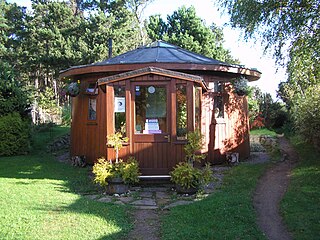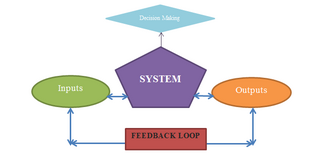Related Research Articles

A business plan is a formal written document containing the goals of a business, the methods for attaining those goals, and the time-frame for the achievement of the goals. It also describes the nature of the business, background information on the organization, the organization's financial projections, and the strategies it intends to implement to achieve the stated targets. In its entirety, this document serves as a road-map that provides direction to the business.
Adaptive management (AM), also known as adaptive resource management (ARM) or adaptive environmental assessment and management (AEAM), is a structured, iterative process of robust decision making in the face of uncertainty, with an aim to reducing uncertainty over time via system monitoring. In this way, decision making simultaneously meets one or more resource management objectives and, either passively or actively, accrues information needed to improve future management. Adaptive management is a tool which should be used not only to change a system, but also to learn about the system. Because adaptive management is based on a learning process, it improves long-run management outcomes. The challenge in using the adaptive management approach lies in finding the correct balance between gaining knowledge to improve management in the future and achieving the best short-term outcome based on current knowledge. This approach has more recently been employed in implementing international development programs.
A social enterprise is an organization that applies commercial strategies to maximize improvements in financial, social and environmental, the Triple bottom line, well-being—this may include maximizing social impact alongside profits for co-owners.
A sustainable business, or a green business, is an enterprise that has minimal negative impact or potentially a positive effect on the global or local environment, community, society, or economy—a business that strives to meet the triple bottom line. They cluster under different groupings and the whole is sometimes referred to as "green capitalism." Often, sustainable businesses have progressive environmental and human rights policies. In general, business is described as green if it matches the following four criteria:
- It incorporates principles of sustainability into each of its business decisions.
- It supplies environmentally friendly products or services that replaces demand for nongreen products and/or services.
- It is greener than traditional competition.
- It has made an enduring commitment to environmental principles in its business operations.
Sustainability advertising is communications geared towards promoting social, economic and environmental benefits (sustainability) of products, services or actions through paid advertising in media in order to encourage responsible behavior of consumers.

Findhorn Ecovillage is an experimental architectural community project based at The Park, in Moray, Scotland, near the village of Findhorn. The project's main aim is to demonstrate a sustainable development in environmental, social, and economic terms. Work began in the early 1980s under the auspices of the Findhorn Foundation but now includes a wide diversity of organisations and activities. Numerous different ecological techniques are in use, and the project has won a variety of awards, including the UN-Habitat Best Practice Designation in 1998.
Corporate sustainability is an approach aiming to create long-term stakeholder value through the implementation of a business strategy that focuses on the ethical, social, environmental, cultural, and economic dimensions of doing business. The strategies created are intended to foster longevity, transparency, and proper employee development within business organizations.

Regenerative design is a process-oriented whole systems approach to design. The term "regenerative" describes processes that restore, renew or revitalize their own sources of energy and materials. Regenerative design uses whole systems thinking to create resilient and equitable systems that integrate the needs of society with the integrity of nature.
Ecological design or ecodesign is an approach to designing products and services with special consideration for the environmental impacts of the product during its whole lifecycle. It was defined by Sim Van der Ryn and Stuart Cowan as "any form of design that minimizes environmentally destructive impacts by integrating itself with living processes." Ecological design is an integrative ecologically responsible design discipline. Ecological design can also be defined as the process within design and development of integration of environmental consideration into product and service design and development with the aim of reducing environmental impacts of products through their life cycle.
Sustainability metrics and indices are measures of sustainability, and attempt to quantify beyond the generic concept. Though there are disagreements among those from different disciplines, these disciplines and international organizations have each offered measures or indicators of how to measure the concept.

Community wind projects are locally owned by farmers, investors, businesses, schools, utilities, or other public or private entities who utilize wind energy to support and reduce energy costs to the local community. The key feature is that local community members have a significant, direct financial stake in the project beyond land lease payments and tax revenue. Projects may be used for on-site power or to generate wholesale power for sale, usually on a commercial-scale greater than 100 kW.
Environmental adult education is recognized as a "hybrid outgrowth of the environmental movement and adult education, combining an ecological orientation with a learning paradigm to provide a vigorous educational approach to environmental concerns."

Social sustainability is the least defined and least understood of the different ways of approaching sustainability and sustainable development. Social sustainability has had considerably less attention in public dialogue than economic and environmental sustainability.
Alternative Energy Institute was West Texas A&M University's alternative energy research branch. Formed in 1977, the program was nationally and internationally recognized, and along with research provides education and outreach around the U.S. and the globe.
A sustainability organization is (1) an organized group of people that aims to advance sustainability and/or (2) those actions of organizing something sustainably. Unlike many business organizations, sustainability organizations are not limited to implementing sustainability strategies which provide them with economic and cultural benefits attained through environmental responsibility. For sustainability organizations, sustainability can also be an end in itself without further justifications.

Wind Powering America (WPA) is an initiative of the United States Department of Energy (DOE) that seeks to increase the use of wind energy throughout the United States. WPA collaborates with key state and regional stakeholders, including farmers, ranchers, Native Americans, rural electric cooperatives, consumer-owned utilities, and schools to break down barriers associated with wind energy development.
Sustainable products are those products that provide environmental, social and economic benefits while protecting public health and environment over their whole life cycle, from the extraction of raw materials until the final disposal.

The Center for Process Studies was founded in 1973 by John B. Cobb and David Ray Griffin to encourage exploration of the relevance of process thought to many fields of reflection and action. As a faculty center of Claremont School of Theology in association with Claremont Graduate University, and through seminars, conferences, publications and the library, CPS seeks to promote new ways of thinking based on the work of philosophers Alfred North Whitehead, and Charles Hartshorne, and others in the process tradition.
International Institute of Rural Reconstruction, also known as IIRR is a non-profit organization that helps empower rural communities by making them self-sufficient. By offering programs across health, education, environment and livelihood, its goal is to have rural communities take charge of their own success. The organization has delivered programs to more than 40 countries in Asia, Africa and Latin America and directly impacted the lives of over 5 million people as of 2019.

The Uganda National Entrepreneurship Development Institute (UNEDI) is a privately owned national resource development institution in Uganda whose focus area is entrepreneurship education, training and research. The institute provides training techniques, faculty support, consultancy, research as well as teaching and development of entrepreneurship training materials.
References
- https://web.archive.org/web/20080912050436/http://csba.foresightdesign.org//featured/cse/index.php
- https://web.archive.org/web/20090125095602/http://csba.foresightdesign.org/members/member_detail.php?mid=31
- https://web.archive.org/web/20071004031051/http://www.is4ie.org/images/Nassos_and_Kusz.pdf
- http://www.lmawma.org/index_files/newsletter2003Q2WindTurbine.pdf